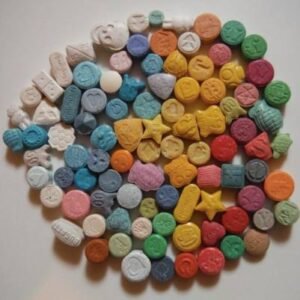MDMA
Understanding MDMA:
Effects, Risks, and Considerations
MDMA, commonly known as ecstasy or molly, is a synthetic psychoactive drug that alters mood and perception. It’s often associated with rave culture and electronic music scenes, but its use extends beyond these environments. While MDMA can produce feelings of euphoria and connection, it also carries significant risks that are important to understand.
What is MDMA?
(3,4-methylenedioxymethamphetamine) is a synthetic drug that acts as both a stimulant and a psychedelic. It primarily affects the neurotransmitters serotonin, dopamine, and norepinephrine in the brain, leading to its characteristic effects. MDMA typically comes in pill or powder form, often taken orally.
Effects of MDMA:
The effects of MDMA can vary greatly depending on dosage, purity, individual tolerance, and environment. However, some common experiences include:
• Euphoria and Mood Enhancement: Users often report feelings of intense happiness, well-being, and emotional warmth.
• Increased Empathy and Sociability: MDMA can promote feelings of connection and closeness to others, making social interactions feel more enjoyable and meaningful.
• Stimulation and Energy: Similar to other stimulants, MDMA can increase energy levels, reduce fatigue, and promote a sense of alertness.
• Altered Perception: Sensory experiences can be heightened, with music, lights, and touch feeling more intense.
• Physical Effects: Users may experience increased heart rate and blood pressure, sweating, jaw clenching, muscle tension, and nausea.
Risks and Side Effects:
While the positive effects can be tempting, it’s essential to be aware of the risks associated with MDMA use:
• Overheating (Hyperthermia): MDMA can significantly raise body temperature, especially in warm environments or during physical exertion. Dehydration is a serious risk associated with this, and it can be life-threatening.
• Hyponatremia: Excessive water consumption without adequate electrolyte intake can lead to a dangerous electrolyte imbalance, causing seizures, swelling of the brain, and even death.
• Cardiovascular Issues: MDMA can strain the cardiovascular system, increasing the risk of heart attack or stroke, particularly in individuals with pre-existing heart conditions.• Mental Health Effects: MDMA can exacerbate underlying mental health issues, like anxiety and depression. Some individuals may experience paranoia, confusion, or panic attacks.• Post-Use “Crash”: The depletion of neurotransmitters can lead to a “comedown” characterized by fatigue, irritability, depression, and difficulty concentrating, which can last for days after MDMA use.
• Long-Term Effects: Regular or heavy use of MDMA can lead to long-term changes in the brain, including potential cognitive impairment, memory problems, and sleep disturbances.• Unpredictable Purity and Adulterants: Illegally produced MDMA is often cut with other substances, some of which can be more dangerous or have unpredictable effects.
• Addiction and Dependence: Although not considered as addictive as some other drugs, regular MDMA use can lead to psychological dependence and tolerance.• Serotonin Syndrome: If used with other substances that affect serotonin (like some antidepressants)
Important Considerations:
• Dosage Matters: Taking too much MDMA significantly increases the risk of adverse effects.
• Stay Hydrated, but Not Overly So: Sip water throughout the day, but avoid excessive consumption.
• Be Aware of Your Environment: Avoid using MDMA in extremely hot or crowded environments.
• Don’t Mix Substances:
Showing all 3 results
-
MDMA
MDMA Crystals
£200.00 – £1,300.00Select options This product has multiple variants. The options may be chosen on the product pageClear10 Grams20 Grams50 Grams100 Grams -
MDMA
MDMA Ecstacy Tabs
£230.00 – £500.00Select options This product has multiple variants. The options may be chosen on the product pageClear100 Pills250 Pills500 Pills





